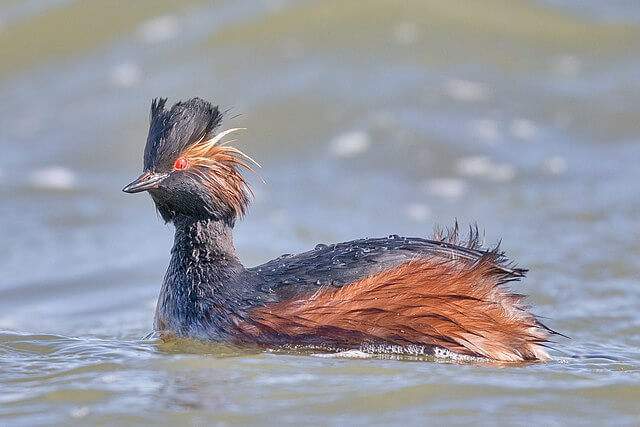
Conservationists are celebrating a record year for the black-necked grebe at St Aidan’s Nature Park near Leeds, West Yorkshire.
In 2023, this rare wetlands bird experienced a significant boost in its numbers, making the park home to 30% of the UK’s black-necked grebe population.
The RSPB has reported 18 breeding pairs at the site, fostering hopes for a similarly prosperous breeding season this spring. This figure reflects a notable increase from the 12 pairs recorded in 2015 and 17 in 2021.
The diligent efforts of conservationists at St Aidan’s to manage water levels and establish new areas of shallow water and dense reeds have paid off, providing ideal conditions for the grebes to feed and nest.
As a result, these pairs successfully fledged 12 chicks last year, tying for the second-highest count ever recorded, which suggests potential for further population growth.
Listed on the Birds of Conservation Concern’s “amber” list indicating moderate conservation concerns, black-necked grebes are among the UK’s rarest breeding birds. They are particularly noted for their striking golden feather tufts and vivid red eyes.
The breeding season showcases their unique courtship rituals, which include synchronised swimming, head wagging, and the dramatic “penguin dance,” where mating pairs rise from the water together.
However, these birds face significant challenges including habitat loss, climate change impacts such as extreme weather events, food scarcity due to declining small fish populations, and disease threats like avian influenza.
RSPB St Aidan’s warden John Ingham said: “Black-necked grebes aren’t just one of the rarest breeding birds in the UK – they are also one of the most beautiful.
“Unmistakable with that piercing red eye and golden ear tufts, at a distance, they may be quite unassuming with their diminutive size, but up close they are simply stunning.
“Based on the successful breeding season last year and mild winter, we would hope for good numbers of black-necked grebe again this spring at RSPB St Aidan’s.”
He warned about the importance of visitor sensitivity, particularly during the breeding season, urging people to stick to designated paths to avoid disturbing the nesting grebes.
With an average of around 54 pairs over the last five years, the UK population of black-necked grebes remains relatively small. Found across North America, Europe, and Asia, the UK lies at the edge of their breeding range, underscoring the critical nature of conservation efforts to support this vulnerable species at St Aidan’s and beyond.
——————————————————————————
At Natural World Fund, we are passionate about stopping the decline in our wildlife.
The decline in our wildlife is shocking and frightening. Without much more support, many of the animals we know and love will continue in their decline towards extinction.
When you help to restore a patch of degraded land through rewilding to forests, meadows, or wetlands, you have a massive impact on the biodiversity at a local level. You give animals a home and food that they otherwise would not have had, and it has a positive snowball effect on the food chain.
We are convinced that this is much better for the UK than growing lots of fast-growing coniferous trees, solely to remove carbon, that don’t actually help our animals to thrive.
This is why we stand for restoring nature in the UK through responsible rewilding. For us, it is the right thing to do. Let’s do what’s right for nature!
Donate today at https://naturalworldfund.com/ and join in the solution!

